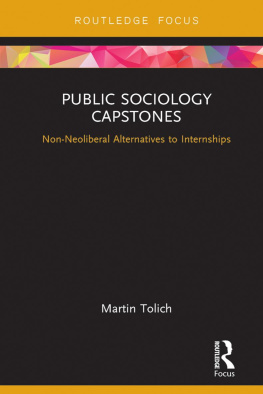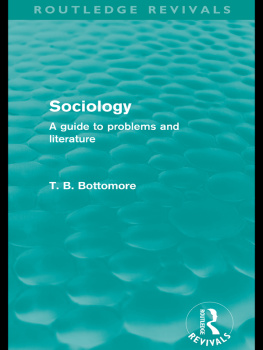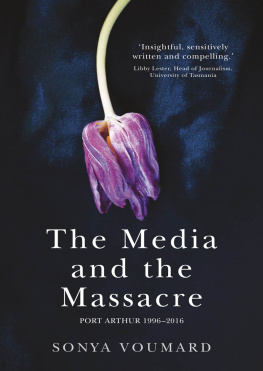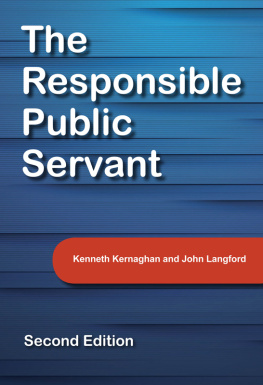Public Sociology Capstones
Social science departments, both nationally and internationally, market boundless career destinations for their graduates but fail to identify the pathways to these lucrative destinations, and appear oblivious to the social forces that threaten their existence, such as the discerning parents investment in their offsprings education and mounting individual student debt. This book responds to these social forces, drawing on Michael Burawoys model of Public Sociology to show how a research-centred experiential internship provides opportunities for students to draw on their prior learning and realise their potential to create pathways towards employment. The author demonstrates how a specific, research-based course leading to employment with a non-government organisation or government department was evaluated and incrementally developed, giving voice to its multiple beneficiaries. Designed for university teachers, this book will appeal to those in social science departments who are using an internship, service learning or capstone model for their senior undergraduate classes.
Martin Tolich is Associate Professor of Sociology at the University of Otago, New Zealand. He is the co-editor of Qualitative Ethics in Practice and Social Science Research in New Zealand and the co-author of Planning Ethically Responsible Research and Getting Started: An Introduction to Research Methods.
First published 2018
by Routledge
2 Park Square, Milton Park, Abingdon, Oxon OX14 4RN
and by Routledge
711 Third Avenue, New York, NY 10017
Routledge is an imprint of the Taylor & Francis Group, an informa business
2018 Martin Tolich
The right of Martin Tolich to be identified as author of this work has been asserted by him in accordance with sections 77 and 78 of the Copyright, Designs and Patents Act 1988.
All rights reserved. No part of this book may be reprinted or reproduced or utilised in any form or by any electronic, mechanical, or other means, now known or hereafter invented, including photocopying and recording, or in any information storage or retrieval system, without permission in writing from the publishers.
Trademark notice : Product or corporate names may be trademarks or registered trademarks, and are used only for identification and explanation without intent to infringe.
British Library Cataloguing-in-Publication Data
A catalogue record for this book is available from the British Library
Library of Congress Cataloging-in-Publication Data
A catalog record has been requested for this book
ISBN: 978-0-8153-6032-2 (hbk)
ISBN: 978-1-351-11850-7 (ebk)
Typeset in Times New Roman
by Deanta Global Publishing Services, Chennai, India
To the parents I met at the Humanities graduation at the University of Otago in 2008 who asked me what their children could do with a degree in Sociology. It has taken a decade to formulate but this book is my answer. With thanks.
This book outlines the creation of a Public Sociology Capstone course I have taught at the University of Otago since 2012. Each iteration of the course is described below, and there is yet still room for improvement.
This book has two trigger points. The first occurred in 2007 when the Christchurch Press (Editorial, 2007) mocked Canterbury Universitys Bachelor of Arts (BA) programme, seeing it as standing for bugger all and a weak cop-out for an education. Johnson (2011) reports that the College of Arts administration at the University of Canterbury, lacking financial and popular support, realised the need to demonstrate the real-worth applicability of the BA. The answer they developed was an internship program they labelled work integrated learning , designed to both counter the negative commentary and, eventually, to work with and capitalise on the universitys neoliberal investment.
The purpose of the Canterbury University work integrated learning innovation was to create a course where students could learn about themselves and the world of work. Johnson saw this as well suited to the current local economic situation (Johnson, 2011, 175), and was both the course controller of the innovation and the researcher who evaluated the course. She reports that her students saw knowledge and its value as a commodity to be acquired, to be hoarded and, ultimately, to be bartered in the marketplace of salaries and prestige.
Johnson (2011, 176) concluded the mingling of education and industry objectives invites questioning around the purpose of a university education. What is the role of a university? Johnson says that if you look at education through an emancipatory lens, education should do more than just train workers. The internship course had the potential to generate citizens who work for their social justice rather than conform to the status quo. The outcomes were not what she had hoped (Johnson, 2011, 179).
All interns articulated a deep investment in neoliberal market-based ideologies, this in spite of the various [social emancipatory] targeted readings that framed challenges to neoliberal ideals.
In sum, Canterbury Universitys social science internships reproduced students with a sense of their own entitlement and privilege rather than political disquiet. This sentiment or outcome is not the promise of social science; Sociology students look outward, trained to help others and to understand the way the social world works and how it might be changed for the better. That is what Johnson wanted to achieve but could not. She drew on others to transcend self-obsession (2011, 177):
Conceived through these [Freirean/Deweyan] emancipatory lenses, education has the potential to generate citizens/professionals who work for social justice rather than reproducing conformity to the status quo. In the Freirean/Deweyan conceptualisation, education should emancipate it citizenry to help them to become active moral agents.
The second trigger point occurred in 2008 when I met with a few Sociology students parents over a cup of coffee before graduation. Parents shared concerns about students graduating with bugger all, asking me what their son or daughter could do with a BA in Sociology. I had no immediate answer other than to say that their childrens course of study did not lead to a specific market vocation such as teaching or accountancy, yet their achievement was certainly not without substance. Neither I nor those parents were impressed with this answer.
This book spans a decade, as I fleshed out an answer. Outlining destinations for these students and parents, however, is not the goal of this book. While employment potential for Sociology graduates is indeed limitless, destinations are not pathways .
These parents did not see Sociology as a route to employment. They did not buy the argument that their children were learning about society and that this would lead to employmentthey are not alone. Sociology undergraduates ask similar questions: What can they do with Sociology beyond providing an academic critique of sociological research and society? The question is a global phenomenon (Finkelstein, 2009, 90).
Students at Clark University in Massachusetts ask similar questions and are promised destinations: What can I do with a degree in Sociology?
Because of the emphasis placed upon critical thinking, analytic and communicative skills, and methodological training, students majoring in Sociology are well equipped to enter a variety of occupations, as well as professional and graduate schools. Sociology majors have gone to law school, medical school, social work, and business school. Others have become marketing analysts, government policy analysts, university administrators and political consultants.













